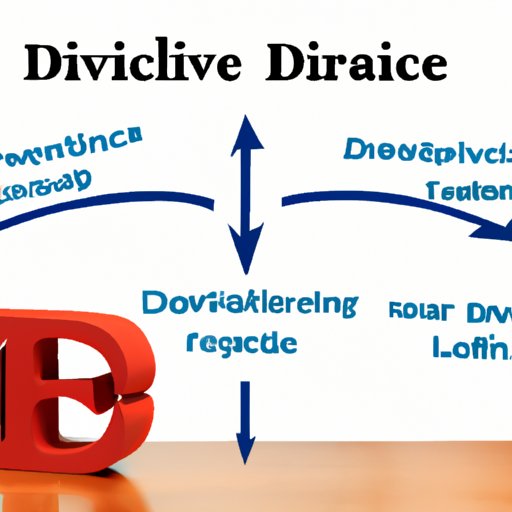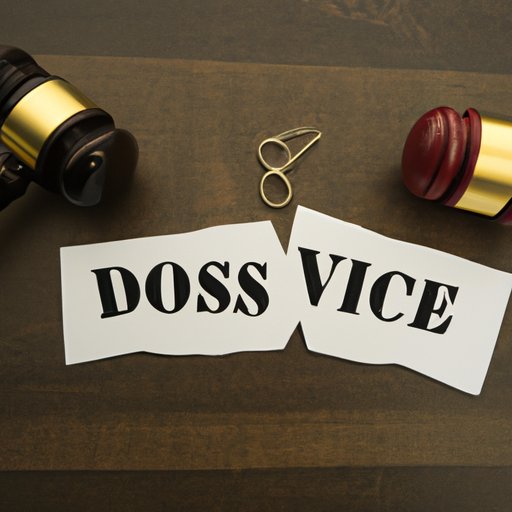Introduction
Divorce is an emotionally and financially taxing experience, especially if both parties have not yet reached an agreement on how to separate their assets and liabilities. It is important to understand the process and associated costs in order to make an informed decision about whether to hire a lawyer or take on a do-it-yourself (DIY) divorce. This article will explore the various expenses associated with filing for divorce without legal representation and provide insight into the pros and cons of a DIY divorce.

Analyzing the Cost of a DIY Divorce
When considering the cost of a divorce without a lawyer, it is important to first understand the difference between an uncontested and contested divorce. An uncontested divorce is one in which both parties agree on all issues related to the separation, including child custody and support, division of assets and liabilities, and alimony. A contested divorce is one in which at least one party does not agree on some or all of the separation issues. The cost of a DIY divorce is generally lower for an uncontested divorce, as the court will only need to process the paperwork, while a contested divorce requires additional hearings and mediation services.
The primary expense associated with a DIY divorce is the court filing fees. These fees vary by jurisdiction, but typically range from $100-$400. Other expenses to consider are any fees associated with obtaining copies of financial documents, such as bank statements and tax returns. Additionally, there may be other miscellaneous fees, such as postage and certified mailings, that can add up over time. Finally, if you choose to use a third-party service, such as an online divorce filing platform, you may need to pay an additional fee.
How Much Can You Expect to Spend on a Do-It-Yourself Divorce?
The cost of a DIY divorce without a lawyer depends largely on the complexity of the case and whether it is uncontested or contested. For an uncontested divorce, the total cost is typically around $500-$1,000, depending on the jurisdiction and court filing fees. This cost may be higher if you are required to obtain copies of financial documents or utilize the services of a third-party provider.
For a contested divorce, the cost can quickly become much more expensive. In addition to the court filing fees, you will likely incur additional expenses for mediation services, court hearings, preparation of legal documents, and professional services. Depending on the complexity of the case, these costs can range from a few hundred dollars to several thousand dollars.
Understanding the Cost of a Pro Se Divorce
A pro se divorce is one in which the parties represent themselves in court without the assistance of an attorney. This type of divorce is often less expensive than hiring a lawyer, but it can still be costly. The primary expenses associated with a pro se divorce are the preparation of legal documents, court hearings and mediations, and professional services. Depending on the jurisdiction and complexity of the case, these costs can range from a few hundred dollars to several thousand dollars.
The most significant expense associated with a pro se divorce is typically the preparation of legal documents. This includes drafting the petition for divorce, preparing the marital settlement agreement, and filing the necessary paperwork with the court. Depending on the complexity of the case, these costs can range from a few hundred dollars to several thousand dollars. Additionally, if you require the assistance of a mediator or other professional services, the costs can quickly add up.

Navigating the Process of an Unrepresented Divorce
If you decide to take on a DIY divorce without the assistance of a lawyer, it is important to understand the process and familiarize yourself with the state laws. You should begin by gathering the necessary documents, such as financial records, property titles, and tax returns. Once you have all of the documents, you will need to submit them to the court along with the appropriate forms. You will then need to attend all court hearings and comply with the judge’s orders.
Filing for divorce without legal representation can be a complicated process, and it is important to understand the state laws and court system. If you are unfamiliar with the process, it is best to seek the advice of a qualified attorney or utilize the services of a third-party provider. Additionally, you should carefully consider the pros and cons of a DIY divorce before making a final decision.

What to Know Before Taking on a DIY Divorce
Before deciding to file for divorce without a lawyer, it is important to consider whether you are prepared to handle the legal work. Filing for divorce without legal representation is a complicated process, and if you are unfamiliar with the law, you may find yourself in over your head. Additionally, it is important to consider whether you should hire an attorney to assist you in the process. An attorney can provide valuable guidance and advice throughout the process and ensure that your rights are protected.
Finally, it is important to know what resources are available to guide you through the process. There are many online resources, such as do-it-yourself divorce websites and books, that can provide helpful information and tips. Additionally, many counties offer free or low-cost divorce clinics to help individuals who are filing for divorce without a lawyer. These clinics can provide valuable information and guidance throughout the process.
Conclusion
Divorce can be an expensive process regardless of whether you hire a lawyer or go it alone. It is important to understand the various costs associated with a DIY divorce and the process of filing for divorce without legal representation. Additionally, it is important to consider whether you are prepared to handle the legal work and, if not, if it is worth hiring an attorney to assist you. Ultimately, the cost of a DIY divorce without a lawyer depends on the complexity of the case and whether it is uncontested or contested.
(Note: Is this article not meeting your expectations? Do you have knowledge or insights to share? Unlock new opportunities and expand your reach by joining our authors team. Click Registration to join us and share your expertise with our readers.)
